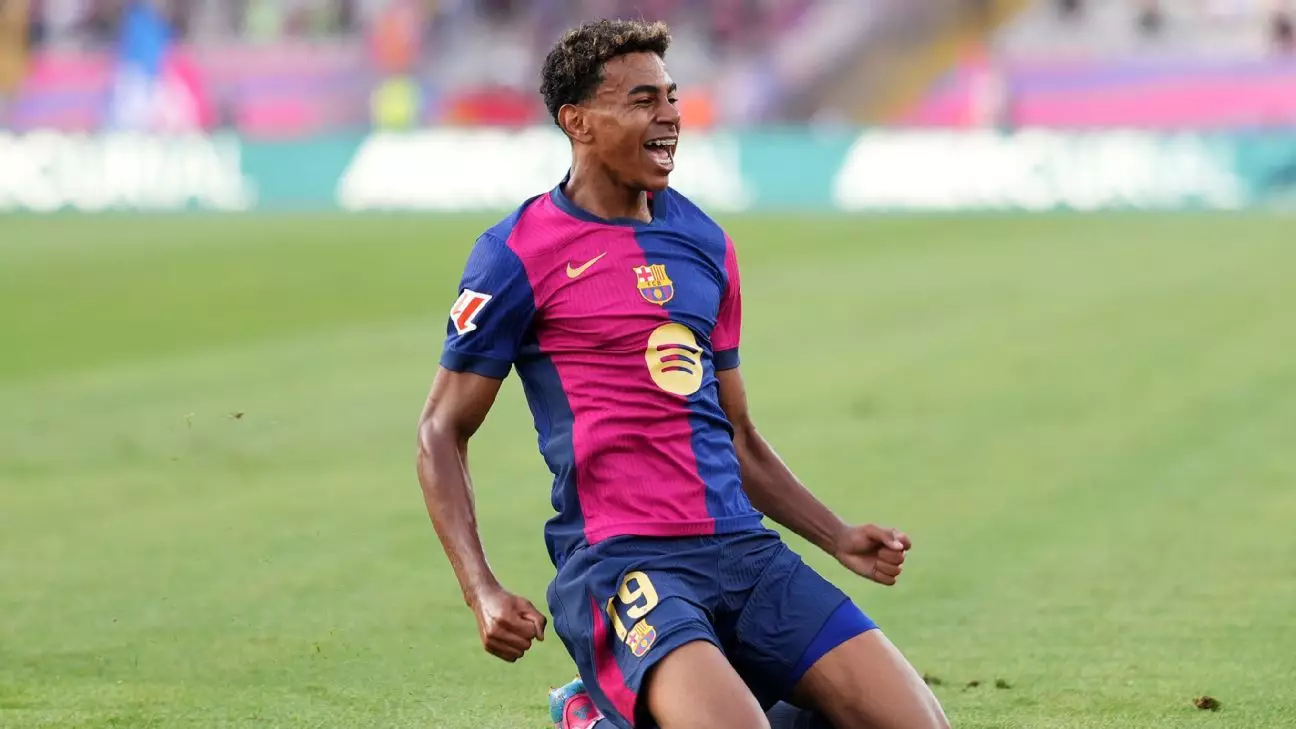In recent months, FC Barcelona has been navigating a turbulent financial landscape while simultaneously investing in an impressive roster of young talent. Central to this endeavor is the remarkable forward, Lamine Yamal, a player whose potential has caught the attention of Europe’s elite clubs. Barcelona president Joan Laporta recently confirmed the club’s decision to reject a staggering $270 million offer for the burgeoning star, defending this move as a commitment to sporting values rather than a reaction to financial pressures. The question remains—are they making a sound strategic choice, or is this a gamble that could come back to haunt them?
Laporta’s assertion that Barcelona is making decisions based on sporting merits rather than financial necessity seems to be a critical angle of the club’s current philosophy. In his interviews, he insists that the players leaving the club, such as Ousmane Dembélé, have done so for reasons related to their careers rather than the club’s inability to retain them. The narrative suggests that the management is rejuvenating the squad by prioritizing those who genuinely wish to don the Barcelona jersey.
While the intent is commendable, skepticism surrounding the club’s financial woes is difficult to ignore. Barcelona has endured severe monetary difficulties over recent seasons, leading to significant changes within their squad. Thus, the rejection of substantial offers for a prodigy like Yamal not only showcases the faith invested in him but raises eyebrows about the reality behind Laporta’s claim. It requires immense confidence in both Yamal’s abilities and future growth, as well as the club’s own financial stability.
Lamine Yamal, now 17, burst onto the scene as a 15-year-old and has quickly established himself as a key player for both Barcelona and the Spanish national team. His remarkable performances, including a significant role in Spain’s recent European Championship victory, have led many to tout him as one of the brightest prospects on the international stage. Cesc Fàbregas went so far as to call him the biggest talent in world football, a bold proclamation that, while flattering, also poses risks related to the heightened expectations placed upon young shoulders.
Yamal’s rapid development, however, sparks legitimate concern regarding player management and physical burnout. The specter of injury looms large, as seen through the experiences of fellow young star Pedri, who has faced setbacks after extended play for both club and country. The challenge for Barcelona lies in balancing the need to capitalize on Yamal’s burgeoning talent while ensuring the sustainability of his fitness and career.
The tensions between clubs and national teams often spark controversy, particularly when it concerns the management of young talents. With national team coaches prioritizing international duty and clubs wanting to safeguard their investments, potential disputes appear inevitable. This was reflected in Laporta’s recent comments about the responsibility lying with clubs to rest players, especially in instances where overutilization may lead to injury.
Laporta voiced his frustration over how national teams must respect clubs’ financial stakes in their players, emphasizing that clubs are the ones providing the salaries. This bitter divide highlights a broader issue within football: how to manage rising stars effectively without compromising their health. Laporta’s intervention following Yamal’s hamstring strain exemplifies the balance required, suggesting that the club intends to prioritize his well-being, thus aligning their policies with a long-term vision rather than short-term success.
As Barcelona gears up for key matchups against teams like Bayern Munich and rivals Real Madrid, all eyes will be on Yamal’s recovery and impact. His current form, which includes five goals and five assists this season, illustrates his critical role in the team’s attacking prowess. Yet with increased responsibility comes greater scrutiny.
Barça’s commitment to nurturing Yamal while fielding competitive squads in major tournaments is a delicate undertaking. A successful navigation through this period could not only validate Laporta’s strategy but also illustrate a blueprint for effectively managing prodigious talents in the modern game. Conversely, failure to strike the right balance will test the limits of Barcelona’s capacity to maintain their position among Europe’s elite clubs.
Ultimately, the saga surrounding Lamine Yamal symbolizes a crossroads for Barcelona—a constellation of hope and potential flirtation with imminent pitfalls. Only time will reveal whether their decisions prove prudent or precipitate adverse consequences.

